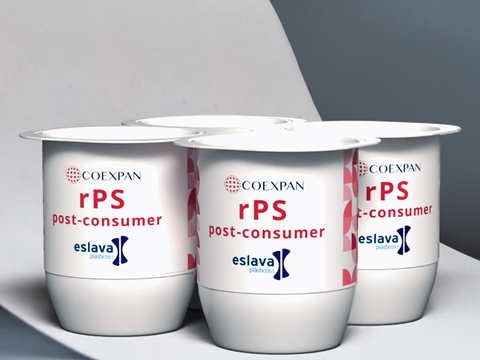
Coexpan and Eslava Plásticos are teaming up to decontaminate post-consumer polystyrene and recycle it into food-grade packaging, closing the loop on formats like yoghurt cups.
Over 350,000 tonnes of polystyrene were used in yoghurt packaging last year, the companies say. The ability to keep post-consumer waste in a food-grade loop is hoped to bring the packaging industry closer to a ‘resilient’ circular economy.
Coexpan and Eslava’s approach uses a jointly developed decontamination technology, currently in an advanced validation stage, to turn used polystyrene packaging into recycled raw materials.
The companies emphasize that they are utilizing mechanical recycling, claiming that its carbon footprint is lower than other recycling methods.
The recycled polystyrene is set to meet high regulatory standards for quality and safety, and Eslava claims to bring ‘all the necessary’ quality and traceability certificates to the table. Its experience in separation and purification via artificial intelligence is expected to unlock a stable supply of recycled raw material for long-term agreements with customers.
Described as a ‘turning point’ for the food packaging sector, the initiative is set to align with the Packaging and Packaging Waste Regulation’s recycled content targets for food-contact polystyrene – as well as keep ‘tonnes’ of plastic out of landfills and incinerators.
“This project reflects Grupo Lantero’s commitment to responsible innovation and the creation of solutions that bring real value to our customers,” says Daniel Carreño, CEO of Grupo Lantero. “We are not only responding to regulatory requirements, but also leading a necessary transformation for the future of food packaging in Europe.”
“After many years of work and development together with the integrated management systems of Spain and France, we are proud to contribute to a solution that shows mechanical recycling can be safe, efficient, and truly circular, and that positions Spain as a leader in sustainable innovation,” continues Eslava CEO David Eslava.
Sergio de Freitas, CEO of Coexpan, adds: “This project is a clear example of how strategic collaboration and technological innovation can produce real and scalable solutions to the sector’s sustainability challenges. At Coexpan we are proud to lead this development, which not only closes the polystyrene loop but does so with guarantees of food safety and industrial efficiency.”
Earlier this year, INEOS Styrolution completed its own collaborative project to mechanically recycle polystyrene into yoghurt cups. The resultant packaging was intended to be sold at Lidl, with an initial consumer test suggesting that 90% of consumers would buy the product – even if the recycled polystyrene was not a pure white colour.
Trinseo went on to unveil a transparent recycled polystyrene resin featuring dissolution technology; the material was intended for use in food-contact applications such as dairy containers, food trays, and hot and cold drink cups. Trinseo believes that the product reduces the carbon footprint of its virgin equivalent by approximately 18%.
If you liked this story, you might also enjoy:
The ultimate guide to the Packaging and Packaging Waste Regulation in 2025
How are the top brands progressing on packaging sustainability?
Everything you need to know about global packaging sustainability regulation in 2025
The key to increasing the use of reusable packaging in supermarkets














No comments yet